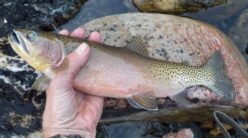Last week, I tried to point out why hunters are the most important conservationists in this and many other countries around the world. What the hunters in the U.S. have done to bring threatened and almost extinct species back from the brink of extinction has been a model for other countries as they develop policies to manage their own wildlife.
Still, there are some anti-hunting folks who are willing to lie and distort facts in an effort to discredit hunters and convince the general public that hunting is a barbaric throwback to the days when anyone who wanted to eat hunted rabbits, birds and big game such as deer, elk and moose, as well as other species.
I ran across such an article online titled, "Hunting, The Murderous Business." The claims made in this article are pretty consistent with what the anti-hunting crowd like to rant about, so I thought I would discuss some of the most common claims.
The first claim: The vast majority of modern hunters in developed countries stalk and kill animals for recreation. If you ask hunters why they hunt, most will tell you for the meat, which is tastier and leaner than the meat at stores. Evidently the anti-hunters haven't bothered to ask hunters why they hunt or the answer doesn't fit their rants, so they have made up a reason they think will bother most people and cast hunters in a bad light. Hunters, of course, know that it may be a recreational activity to camp and travel around the backcountry, but hunting is a lot of work by the time one harvests an animal and processes it for transport back to civilization.
The second claim: Hunting is a violent and cowardly form of entertainment that kills and maims hundreds of millions of animals every year. If the truth were told, hunters care more about the animals they hunt than the anti-hunting crowd do, and hundreds of millions is a number that anti-hunters don't understand or they would know that if the number were true, there would be no animals except the domestic kind anywhere in the world. Get to know some hunters and see if you think they are cowardly, violent, or hunting for entertainment.
The third claim: Wildlife watchers contribute $20 billion more to watching animals than hunters contribute to hunting and wildlife management. Once again, the anti-hunters seem to be unaware of how much $20 billion is over what hunters contribute to wildlife management and habitat restoration. For example, through state licences and fees, hunters pay $796 million a year for state conservation programs. Hunters pay an 11 percent tax that they requested on guns, ammo, bows and arrows, which culminated in the Pittman Robertson Act that has generated $11 billion for wildlife conservation. Through donations from hunters to the Rocky Mountain Elk Foundation, $440 million a year is generated for wildlife conservation. All together, hunters pay more than $1.6 billion a year and have been doing it since 1937. That is roughly $131.2 billion that hunters have contributed to wildlife conservation and habitat restoration since 1937. These figures are available from local Fish and Game offices or online.
The fourth claim: Hunting is not a sport. I agree. The only reason I included this claim is because anti-hunters claim that hunters themselves call hunting a sport. I don't know any hunter who has ever insinuated that hunting was anything except hard work, even though we all enjoy getting away from civilization for a while and living in the wild. President Theodore Roosevelt may have put it best when he wrote, "Hunting, the finding of game is after all a part of the whole. The free, self reliant, adventurous life, with it's rugged, and stalwart democracy; the wild surroundings, the grand beauty of the scenery, the chance to study the ways and habits of the woodland creatures-all these unite to give to the career of the wilderness hunter it's particular charm. The chase is among the best of all national pastimes and it cultivates that vigorous manliness for the lack of which in a nation, as in an individual, the possession of no other qualities can possibly atone." At the time Roosevelt wrote this, women were not hunting in the numbers they are now, They certainly deserve to be included as an important part of the hunting community, but if he were writing the statement today I think he would have included them.
The fifth claim: Hunting causes animals pain and suffering. My question is, as opposed to what? A natural death in the wilderness involves being eaten alive, being crippled by a fall or an unfortunate encounter with a predator other than man or living long enough to not make it through the coming winter and freezing to death, as well as falling through the ice and becoming exhausted and drowning. Nature is a merciless killer of wildlife that spares them no pain.
As hunters, we try to place the shot or arrow where it will kill quickly. However, if the first shot does not kill the game immediately, we take another shot or follow the game until we find it dead or can finish it off as soon as possible. Although none of us are perfect, every hunter has been taught to to make sure the first shot will immediately incapacitate the game. Most of us get pretty good at it and save the game from a natural death, which is always more painful and drawn out over a longer period of time.
The sixth claim: With the arsenal of weapons available to hunters, the game has no chance and fair chase is just a myth perpetuated by hunters. The fact is, the game has the advantage in the wilderness they live in. They see and hear far better than we do, they are faster than us and when they hear and see us they are often gone before we are even aware of them. They know all the trails through the area and disappear leaving us to wonder how they were able to get out of the area without being seen.
We, on the other hand, must learn how to outsmart them. That entails scouting the area before the season opens and being familiar with the area we are hunting, choosing enough rifle or bow for the game we are hunting so, if we are successful in finding them, we can make a clean first shot kill.
The claims of the anti-hunting crowd come from naivety, lies, and purposeful distortions, and an attempt at character misrepresentations of hunters. Hunters are the most effective wildlife conservationists in the U.S and contribute more funds to wildlife management than any other group. The facts are available from your local Fish and Game office or the Idaho Fish and Game website.
If I didn't address your favorite anti-hunting claim, drop me a note at mokeydo41245@gmail.com and I'll try to address your concern.
Smokey Merkley was raised in Idaho and has been hunting since he was 10 years old.



